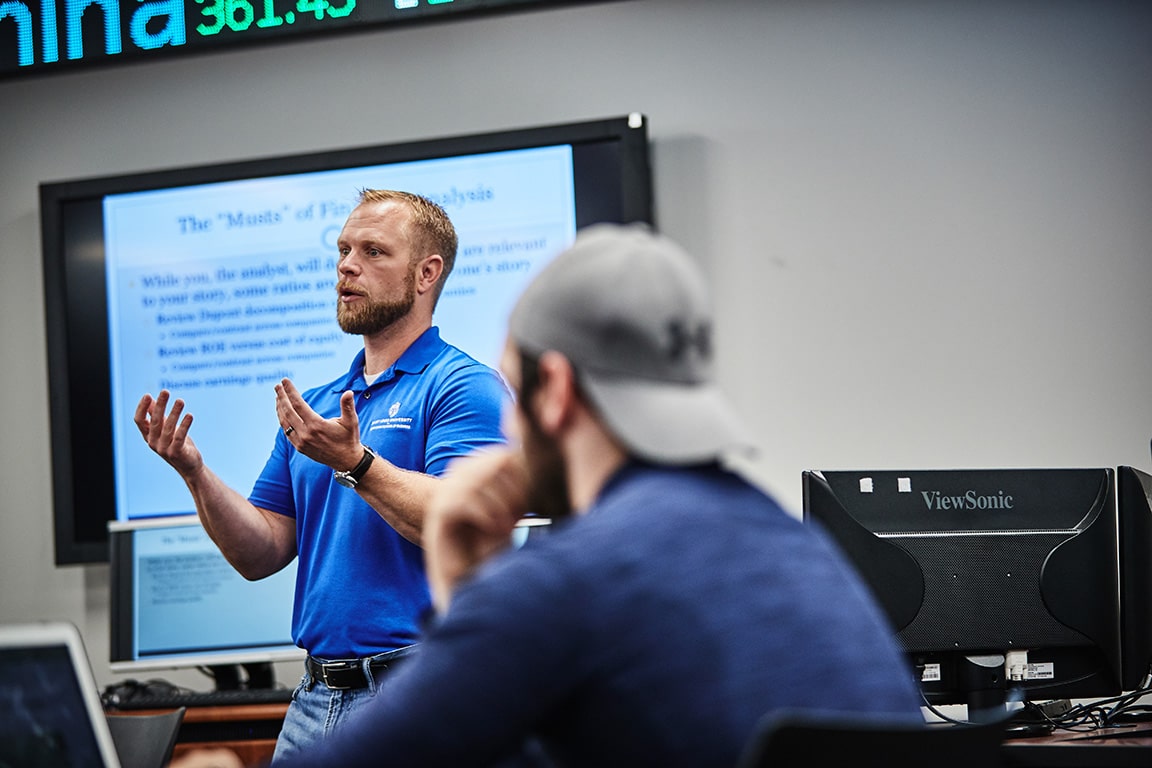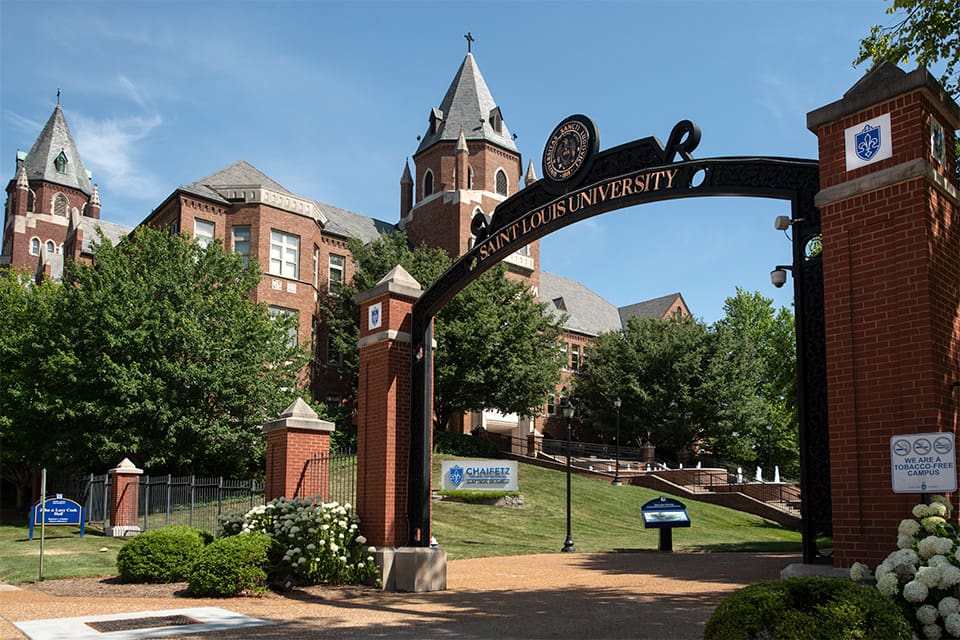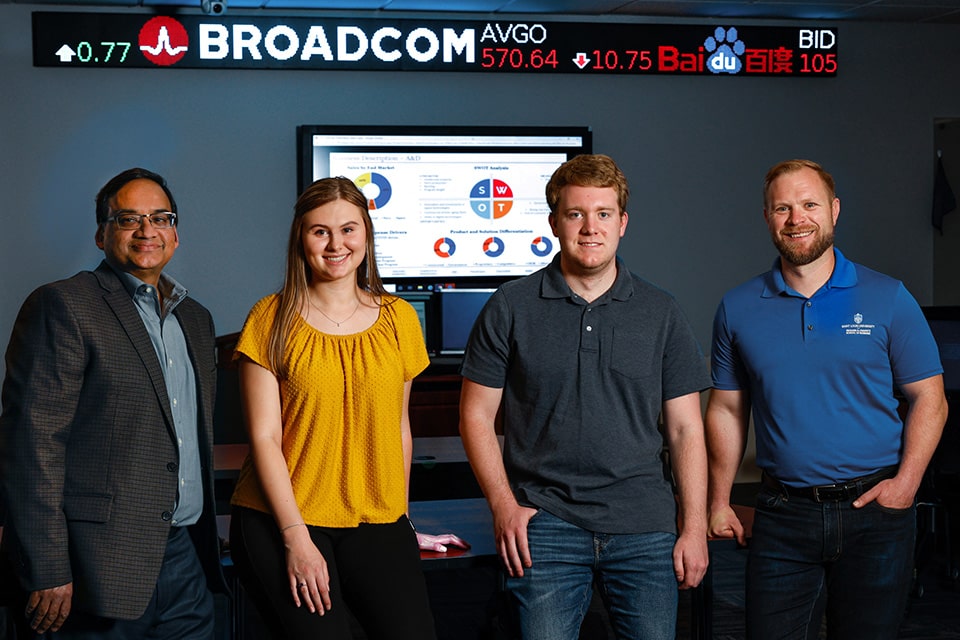Deeply Invested
Overseeing an institution’s collection of financial assets carries great responsibility. For Zoe Pezold (CSB ’22), it also carries great privilege.
Pezold was among a prestigious group of undergraduate finance students given the responsibility of managing $2.5 million of Saint Louis University’s endowment as part of an experiential learning course in the Richard A. Chaifetz School of Business. The Applied Portfolio Management (APM) course allows students, in consultation with industry mentors, the opportunity to learn about the intricacies of the stock market and equity research by directly steering the University’s money.
“I did not take the responsibility lightly,” Pezold said. “I felt honored that the University trusted us with that much money and had faith that we could grow the portfolio and pass on that legacy to the next class.”
Buy, Sell, Hold
Each APM student analyzes a sector of the economy and two or three or stocks within that sector. Some of the stocks already may be in the University’s portfolio; some are under consideration for inclusion.
Working with their industry mentors, students are required to write two highly detailed, professional equity research reports. Each student must then defend their buy, sell or hold recommendations to their peers and professors in a formal presentation, followed by a 10-minute question-and-answer session. As part of their final project, the students work collaboratively to decide what, if any, changes will be made to the portfolio. The next class picks up where the previous class left off.
Jacob Dowell (CBS ’22), who took the APM course in 2021, chose the industrial sector and analyzed Honeywell (already in SLU’s portfolio), Federal Signal and the Alamo Group.
“I was pretty grounded in the theoretical understanding of economics and finance, but until I took the APM course I didn’t realize how it actually worked in the industry,” Dowell said. “It was interesting to see how financial analysts put together their reports and how much work goes into those reports.”
The hands-on experience helped me develop skills that only a select number of students have an opportunity to build."
Zoe Pezold (CSB '22)
Pezold chose the communications services sector and analyzed Disney, Netflix (both already in SLU’s portfolio) and the video game company, Activision Blizzard.
“The hands-on experience helped me develop skills that only a select number of students have an opportunity to build,” said Pezold, who also took the course in the fall of 2021. “Most of us wouldn’t be allowed to work with money of that magnitude until we entered the workforce, so I definitely felt ahead of the game.”
Expert Advice
The University introduced the APM course in the fall of 2002 with the initial class managing $500,000 of the University’s endowment funds. In the two decades since then, the portfolio’s value has grown to nearly $2.5 million. A 2016 distribution from the portfolio helped fund the construction of the Edward Jones Data Analytics Lab, a state-of-the-art facility in the business school that houses 12 Bloomberg terminals, a computer system that allows students to access the Bloomberg data service with real-time global financial data and news feeds.
In 2020, Dr. Thomas Doellman, associate professor of finance, enriched the experience by recruiting industry mentors to work one-on-one with the students. Each student is paired with an equity analyst from one of St. Louis’ top financial firms, including Asset Consulting Group LLC, Edward Jones, Kennedy Capital Management, Wells Fargo and NISA Investment Advisors LLC. Students and mentors meet an average of once a week for an hour.
“Many business schools have APM courses, but this mentoring program is unique to SLU,” Doellman said. “It’s powerful and exciting for students to have that connection to the industry, to see that what they’re doing in the classroom is 100% what they will be doing in the industry.”
Larry Pfeffer (CSB ’10), an equity sector analyst at Wells Fargo in St. Louis, took the APM course during his senior year while interning at a financial institution. He said the course was the single most valuable class of his undergraduate education.
“With an internship, you get exposure to people who have experience,” he said. “You see what it’s like to work in a given firm, and you might be asked to assist with tasks that involve real-world work, but your level of decision-making is minimal. With the APM course, you have some guardrails around you, such as your professor and your classmates who offer opinions, but you’re making up your own mind.”
Pfeffer said he chose to volunteer as a mentor in part because his Jesuit education encouraged giving back and because he saw it as an opportunity to stay humble.
“This industry can be really tough, and going back to the beginning by working with students keeps you grounded,” Pfeffer said. “It’s important to be mindful of where everybody starts, and I can’t think of a better way to do that than through an experience like this. And sometimes a student will surprise me by asking questions I hadn’t even considered.”
Since launching the mentorship program two years ago, Doellman said there are more equity analysts offering to volunteer than he has APM students.
Bull Market
Demand is high for the limited number of APM seats, and the application process is rigorous. Students are required to submit names of references, essays and academic transcripts. While 30 or more students typically apply for the innovative learning experience, only 15 to 18 students are accepted into the one-semester, three-credit-hour course each fall.
Dr. Naresh Bansal, chair and professor in the department of finance, said placement is coveted, but the course is not for everyone. He advises applicants in advance that it is academically demanding. The extensive research that goes into the analysis of a company and the preparation needed for communicating insight to a room full of peers, professors and investment professionals requires tremendous preparation.
“We let them know that this course places a huge responsibility on their shoulders and requires a level of commitment greater than what they may be accustomed to,” he said. “If they are not ready to put in many, many hours of work outside the classroom, they should walk away.”
Pezold said she spent more than 120 hours outside the classroom working on her APM assignments. Dowell also recalls putting an immense amount of time into his reports.
“It’s definitely a ton more work than my other courses,” he noted, “but it was proportionally more insightful and useful.”
Benchmarks
Bansal said ample anecdotal evidence demonstrates the positive impact of APM on student success.
He noted that APM students have “stellar placements,” upon graduation. All 2021 APM alumni secured jobs or advanced to higher education. Pezold interviewed with multiple companies and received several offers before deciding to join Equifax. Dowell was accepted into the doctoral program in finance at Boston College, where he plans to conduct research in investment theory. Bansal said leading investment firms contact him regularly looking to hire APM alumni or students considered to be APM material.
Bansal said APM students also led the University to success in the annual Chartered Financial Analyst Institute’s global research challenge. Teams of three-to-five students from participating universities are assigned to analyze publicly traded companies, prepare a written report on their assigned company and recommend whether to buy, sell or hold the stock. Teams present their findings to a panel of industry experts, and winners are selected based on the students’ knowledge and equity analysis.
The University entered two teams composed of 2021 APM students, including Dowell and Pezold, in the competition. Under the direction of Doellman and Bansal, the teams placed first and second in the St. Louis regional competition — a first for the University. Dowell’s team also was one of only 17 teams to advance to the Americas regional competition, which included teams from South, Central and North America. It is the farthest a SLU team ever has advanced in the competition.
Another bonus for students that positions them for success: APM is a required course for students in the financial analysis track. And the rigorous curriculum covers 70% of the material on the Chartered Financial Analyst Level 1 Exam — the first of three exams needed for an a to be credentialed as a CFA.
Bansal and Doellman received the dean’s 2022 Curriculum Innovation Grant for their cultivation of the APM course, the finance department’s flagship program in experiential learning and student success. They plan to use the financial award as seed capital to establish the APM fund to support student scholarships.
The Final Decision
Based on Pezold’s analysis and recommendations, the 2021 APM class chose to keep Disney and Netflix stock in SLU’s portfolio and increased the portfolio’s weight in the communication services sector. Based on Dowell’s recommendations, the students chose to replace Honeywell with Federal Signal and increased the portfolio’s weight in the industrial sector.
About Universitas
Universitas, the award-winning alumni magazine of Saint Louis University, is distributed to SLU alumni, parents and benefactors around the world. The magazine includes campus news, feature stories, alumni profiles and class notes, and has a circulation of 132,265.




















